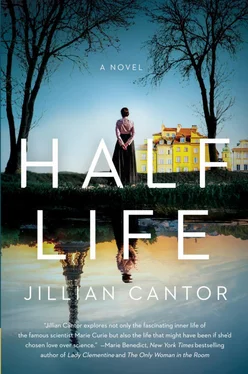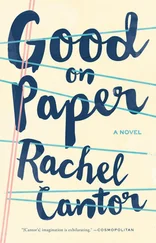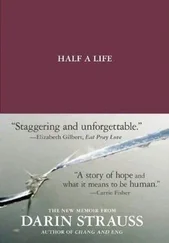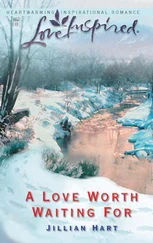My eyes sting with tears, thinking of Pierre. A shared love of each other and our work. But that is what I have with Irène now. She is my partner; she is my confidante. What will I do without her?
And what would Pierre say, if he could be sitting here in this moment? We want her to be happy, mon amour . We want for her a good and easy life.
But she is happy already, with me.
Mon amour , she is a twenty-nine-year-old woman. She is in love.
But what does she know?
“Maman,” she tries gently again, bringing me back to her. “I’m not asking for your permission. I’m telling you what is going to happen. Fred and I love each other. We are getting married.”
What can I do? What can I say? I have lost so much, so many people. As worried as I am for her, giving herself over to a man, I cannot stop her. She is a grown woman, a brilliant scientist. But I cannot lose her either. And most importantly, she cannot lose her herself.
“I will insist upon a prenuptial agreement,” I finally say. “Stating that the lab and all the radium belongs to you and only you.”
“Fine,” she says. “Fred doesn’t care about any of that. He loves me, and I love him.”
“Perhaps you love him now.” I want her to understand, I only want what’s best for her. I do not want her to be hurt by love the way I have been. “But love is fleeting,” I tell her. “Science will never leave you.”
Warsaw, 1926–1932
After Klara graduated from the conservatory, she got a job with a symphony in London. And once she was supporting herself, I told Kaz what I desired more than anything was to move back to Warsaw, my childhood home. Agata had relocated to Warsaw after the war and had expanded our university there, renaming it Women’s University of Poland . I wanted to teach with her once more.
Kaz said that he, too, was ready for a change, and most of all, he wanted me to be happy. He retired from his position at Jagiellonian, and we moved into an apartment in Praga Połnoc, Warsaw, with a very nice view of the Vistula River from our bedroom. I returned to teaching with Agata just a few days after we moved in.
Our children were grown, and our lives were completely different than they once were—Agata’s husband had passed away three years ago, and her son Piotr was studying art in Krakow, but our friendship returned immediately, with all the ease we’d once had working together in the Kaminski house in Loksow.
“Oh, Marya,” Agata said. “How good it is to be with you again.” And I agreed completely, feeling the same about her. “The school was never the same without you.”
I smiled, relieved and happy, thanking her for welcoming me back after all this time and after all the work she had done to build it without me, from the small university it once was in Loksow.
But Agata said that she was the lucky one. “The students have so much to learn from you now, after what you have accomplished, Marya.” She beamed at me with pride.
After I went to Solvay with Hela a few years ago, she helped me patent my device, which I called the Mazur-Zorawksa detonator . But I did not desire money, or fame, and I’d handed the patent over to the Polish government in hopes they could explore ways to use it to help my beautiful country stay beautiful and free and Polish for many generations to come.
I had my experience in the lab and the Mazur-Zorawska detonator to teach a new generation of Polish women about. I taught chemistry and physics classes at Women’s University, as I once had, so many years ago. But now I had a very nice classroom, inside a very nice building, and no fear to walk inside of it.
I reveled in the comforts of teaching, of sitting inside a room with windows and walking to a café for lunch, breathing the fresh Warsaw air again. I loved the sounds of the free Polish language as I walked on the streets each evening toward home, the same paths I’d walked as a girl. Perhaps most of all I enjoyed watching my young students’ faces and eyes light up when I told them stories about Hela and Jacques accepting their Nobel, and me completing Ola Mazur’s research using Hela’s theory, and even Pierre discovering his new element after so many years of wanting.
“You must never give up,” I told these young women, as their bright eyes trained steadily on my face. “You cannot let circumstances or misfortune or age stop you. You must make a choice to keep going. You always have a choice,” I told them.
KAZ’S RETIREMENT DIDN’T LAST VERY LONG, AS HE MISSED the daily interaction with students and conversation about maths. After a few months in Warsaw, he returned to teaching two mornings a week at the University of Warsaw. And then at night, over supper, Kaz and I took pleasure in discussing our students, what we taught and also what we learned each day.
Bronia lived nearby in the suburb of Anin, where she and her Kazimierz and Lou ran a medical clinic, helping patients recover from tuberculosis. Kaz and I saw all three of them at least once a week, for suppers on Sundays.
Hela was still in Paris with Jacques and Marie, all three of them working at the Curie Institute, where they had made great advancements in using magnets for medical imaging. But mainly Marie stayed there to run the lab while Hela and Jacques traveled to give speeches about their work and raise money for their continued research. They went all around Europe, even to America twice, but Hela did not enjoy the travel and wrote to tell me how the older she got, the more she missed Poland, and me, and Bronia.
There is very little science in fame , Hela wrote me, and very little joy for me and Jacques when we are not working in the lab together .
I urged her to move back to Warsaw, to be near me and Bronia, to come and teach with me, and share her knowledge with other young women. Jacques would never leave France , she wrote. And I wondered if, in spite of her complaints, a part of her secretly loved the fame, or if she felt bound to it, some wayward duty? I felt sad that she might never be able to leave it behind, to have a quiet and beautiful life like Bronia and I were enjoying in Warsaw now.
Pierre wrote to me that some days he made it into the lab to assist Marie, but most days he rode his bike through his gardens in Sceaux and was content to let Marie carry on his work. I imagined him riding, his completely white hair and beard fluttering in the wind while he reveled in the scent of flowers. Kaz and I had brought our own bicycles to Warsaw, and on the weekends, we still rode them together, too, sometimes bringing a picnic lunch to enjoy along the banks of the Vistula.
In 1929, Marie sent me a scientific study she published so I could share her results with my students. She was studying the alpha decay of Pierre’s element, and she had determined its half-life to be just 138 days. Which was especially noteworthy compared with that of becquerelium, which was thought to be 1,600 years.
Imagine two such radioactive elements, side by side in the pitchblende, so similar and yet with such a different half-life , she wrote.
Half-life , I thought. What a funny word. So unscientific.
To me it sounded more like the way I might describe how I had lived my entire adult life. One foot inside my reality with Kaz, one foot inside the fantasy of what might have been, what I might have become, had I gone to Paris as a young woman to study at the Sorbonne.
AS PRINCIPAL PIANIST WITH THE LONDON SYMPHONY, KLARA gave concerts all around Europe, and Kaz and I traveled to see her whenever we could manage the cost and the distance, especially in the summers, when neither one of us were teaching. In the summer of 1932, we went to Belgium to hear her play at the Ancienne Belgique in Brussels, then on to Paris, where she played at the Salle Pleyel, and Hela, Jacques, Pierre, and Marie attended with us.
Читать дальше









